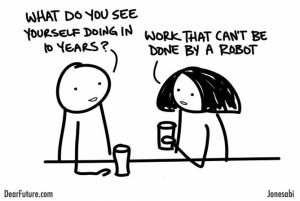The Future of Work and its Impact
The future has cars that drive themselves, currencies that are purely digital, data speeds that are unprecedented, and algorithm-based interactions that you can’t tell are human – which will create millions of opportunities, and obliterate even more.
Things are changing faster than they ever have. ‘Dynamic’ has a face today, and it’s the world we live in. Technology has somehow found a way into everything we do – including, however creepy that reads, our bathrooms. The world today is becoming hyphen-tech. Whether it is education, finance, healthcare, you name it – chances are, you’d have heard of a ‘-tech’ version of it. Ed-tech, health-tech, fin-tech, mar-tech, (toilet-tech?) and the likes. Innovations like artificial intelligence, data analysis, data science, automation are influencing how we work, what we work on, and, as a direct result, the skills we need to stay relevant.
This is the future of work, propelled by the fourth industrial revolution. The first one took birth because water and steam combined to mechanise production; the second used electric power; while the third leveraged IT and electronics. This fourth one comprises of artificial intelligence (AI), machine learning (ML), cognitive sciences, nanotechnology, robotics, quantum computing, and other such technologies that create a promising, but challenging future.
Promising but challenging – challenging you to upskill yourself in order to stay relevant, and promising a bright future in return. The impact of these innovations is already visible in the kind of job roles available today, the jobs that are now obsolete, and the jobs that might be incepted in the next decade.
Case in point: Oxford University has predicted that almost half (48%) of all jobs in the United States will potentially be automated in another 20 years. To give some perspective, imagine yourself in the middle of a room full of people. Now, most of the people towards your right (or left) will have lost their jobs, if they don’t upskill. That is exactly the challenge that we mentioned earlier – one that needs to be tackled head-on.

The rapid pace of technology is quickly flipping the script on what’s needed and what’s not. Current specializations can become outdated and even redundant in only a few short years. According to Deloitte, the half-life of technical skills is now approximately just two years.
All of what we’ve discussed so far is going to have serious consequences. The impact will be felt all around, but especially in these four key areas of work:
- Technological- There’ll be added pressure on companies, especially the legacy ones who are still living in the 80s with their obsolete tech-stack and setup, to move up quite a few notches and match their competitors – especially on the technology front. The good news is that jobs related to developing and deploying new technologies will also grow. Between 2015 and 2030, the money spent on technology will potentially grow by more than 50 per cent according to a McKinsey study. Half of it will be spent on information-technology services. By 2030, this investment could create 20 million to 50 million high-paying jobs at a global level – and the workforce has to #LevelUp to meet this demand.
- Economical- With these advancements, both small scale businesses and larger enterprises are expected to change their technological working inputs. Although larger enterprises might seem to be a more likely bet, they will have to adapt to a leaner, more agile mindset, and think like a startup to adapt to this dynamic new environment.
- Social- Along with novel demands, the industrial revolution has brought with it the opportunity for individuals to use their entire skillset. As per a Forbes article, more than half of American workers will be freelancing by 2027. We interpret it as a subscriber economy – where both companies and employees will work on more fluid and specialized models than traditional engagements.
- Education and Training- Technology is merging more and more with human lives, and this is the crux of the future of work. Students and potential job applicants now want ‘on-demand’ training to meet rapidly changing job descriptions, making it an industry worth $400 bn. Traditional universities are trying hard to catch up with the real world in classrooms. Those looking to future-proof themselves against the tsunami that is the future of work need to #LevelUp fast.
How can you prepare for the future of work?
“We stand on the brink of a technological revolution that will fundamentally alter the way we live, work, and relate to one another. In its scale, scope, and complexity, the transformation will be unlike anything humankind has experienced before,” says Klaus Schwab, Founder and Executive Chairman of The World Economic Forum.
Reskilling, upskilling and redeployment of human capital could bring people and technology closer together, empower the individual and emphasize human skills and capabilities.
Because in reality, the future isn’t so gloomy. While quite a few jobs will be obliterated, they will be replaced by new ones too; 85% of these haven’t even been invented yet. As technology frees up more routine and manual tasks, we need to hone our uniquely human skills that can’t be automated: creativity, conflict resolution, communication, and persuasion.
This globalized era requires intercultural skills, language flexibility, and networking, unlike ever before. Collaborating and delegating teams to work ‘as-and-when’ required with their liquid skills, people will be finding solutions to the questions of machines replacing humans.
The robot has the right solutions. You will be expected to find the right problems.
Write to us at hello@bayone.com for a cheat sheet – and work with us to future-proof yourself against the future of work.

